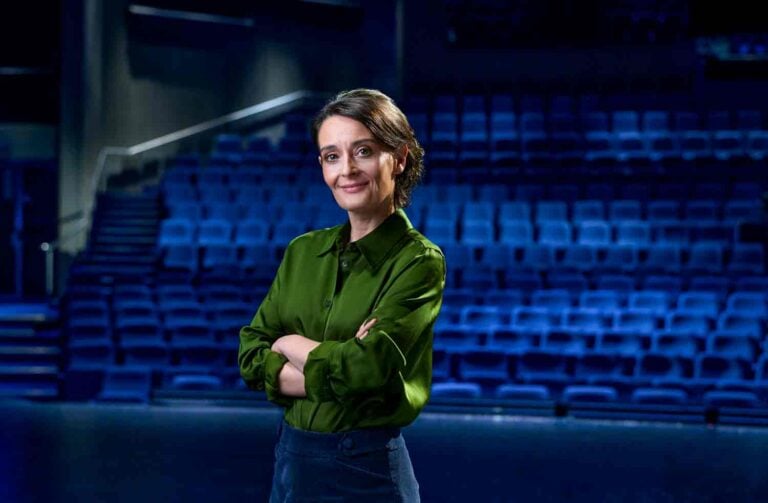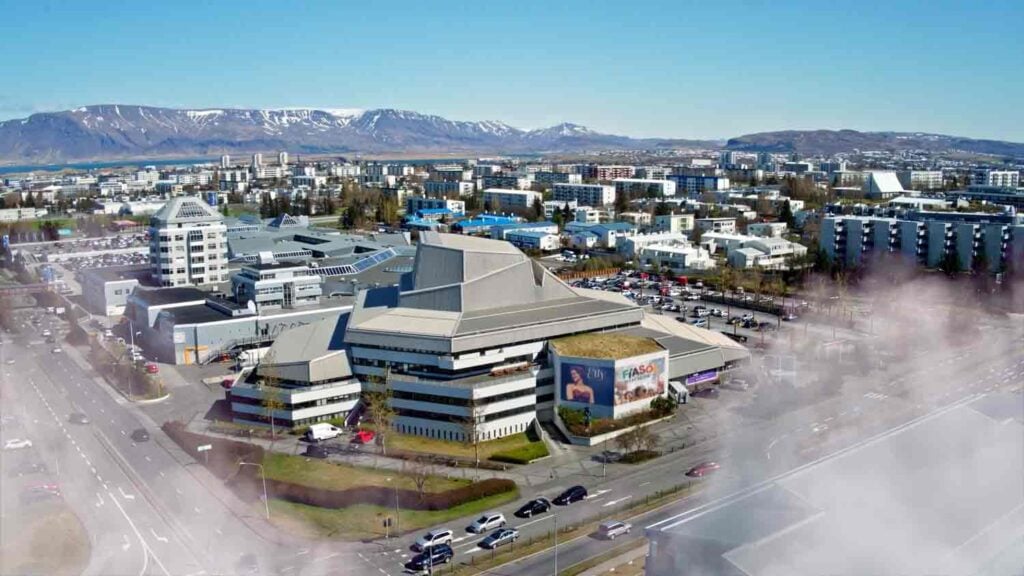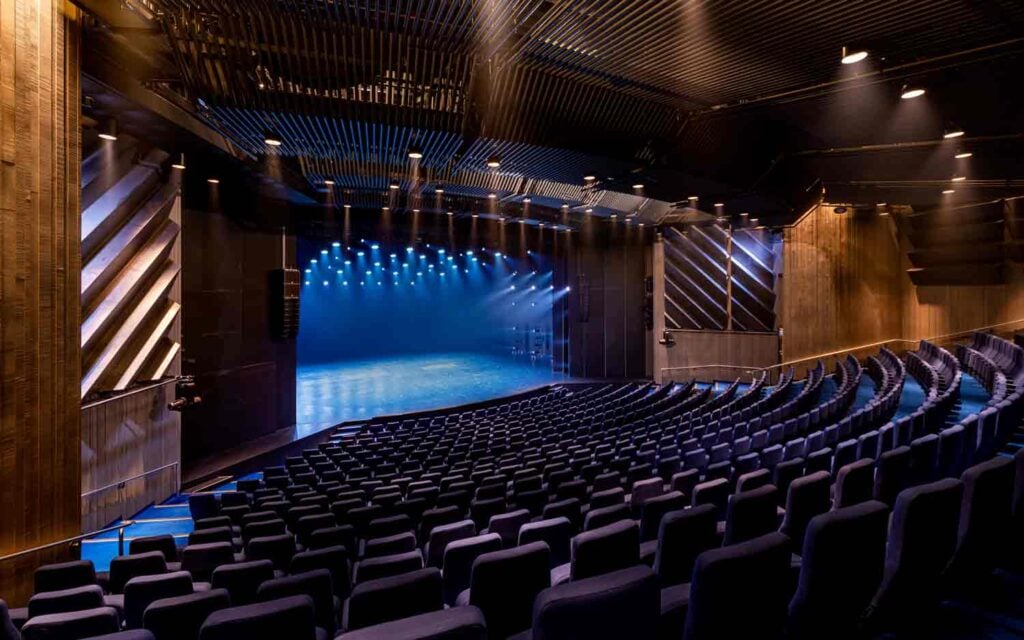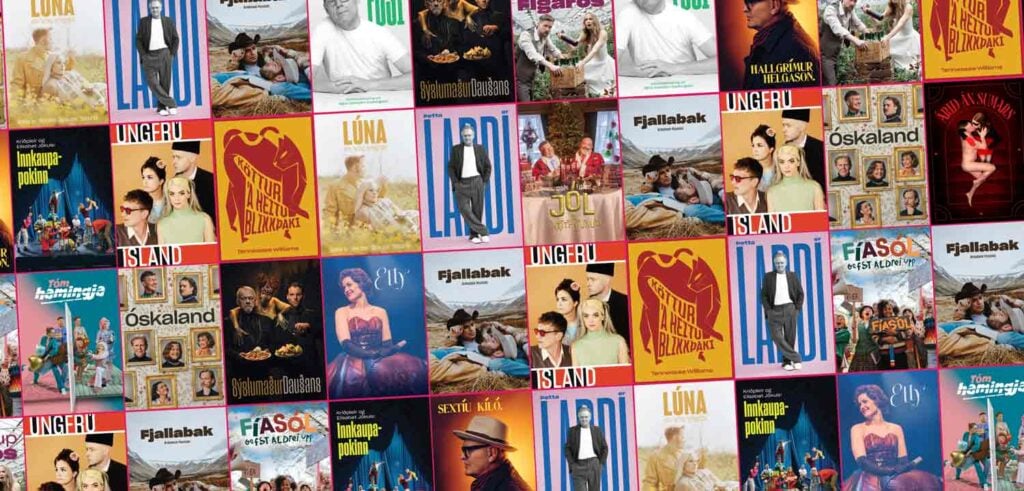The Reykjavík City Theatre is home to the Reykjavík Theatre Company, one of the country’s oldest cultural associations, celebrating its 127th anniversary this year. The upcoming theatre season offers fresh innovations mixed with award-winning classics, Icelandic works alongside foreign ones, and as the season progresses, a national treasure beloved by all will reveal who they truly are.
“We obviously put an immense amount of work into crafting a season that appeals to our audience,” says Brynhildur Gudjónsdóttir, Artistic Director of the Reykjavík City Theatre, when asked about the annual task of putting together the winter schedule. “We meticulously plan the year. Running a theatre—selling a spiritual experience—means we need to capture people’s attention. We know we are competing with all forms of entertainment and also vying for people’s time and the money they have available.”
When asked how best to approach this task, Brynhildur thinks for a moment and adds: “It’s always more successful to read the audience when it comes to putting together a theatre season. The theatre is, in its own way, an institution of upbringing, and we nourish our guests but also delight them. We can never be here to force-feed people anything. We don’t preach, and we can’t tell people how something should be. Instead, we tell the story, and it is up to the person in the audience, wherever they may be on their journey in life, to take it in, process it, and maybe walk out with a changed perspective. That’s the magic of art. That’s why art must sometimes challenge; it needs to be uncomfortable. It can’t always be velvet and silk gloves. Sometimes art has to be harsh. Only then does one experience the world in a different way.”
The Largest Theatre Hall in the Country
The Reykjavík City Theatre began performances in its building by Kringlan in 1989 and has operated there for nearly 35 years. “Our largest hall, which also has the widest, biggest, and best-equipped stage in the country, seats 550 audience members. This is where we stage the big musicals, which we specialize in, as well as major children’s shows. There’s also a certain group of audience members who seek out the great classics, and we’ve featured those on the main stage.”
The Reykjavík City Theatre is the most popular theatre in the country, welcoming nearly 200,000 people each year. In recent years, many productions have been staged that run through the entire season and then continue into the fall. “This has happened here, for example, with the show 9 Lives, which ended with a full house after its 250th performance,” Brynhildur points out. “That means around 30% of the nation came to see the same show.
“Another good example is the renowned show Elly, which broke all records in its time and is returning to the Main Stage by popular demand. “The best scenario at the start of a theatre season is to carry over something from the previous year, or even earlier years, and that’s what we’re doing now with Elly returning five years later. We premiered the show seven years ago, and it ran for two years. Now it’s back on stage, and the interest is undeniable since we’ve already sold out 13 performances.”
That’s quite impressive for a market of this size, and Brynhildur agrees, offering an explanation. It’s found in our Icelandic heritage. “We’re unique; we are a storytelling nation, and we love having stories told to us. I believe it’s in our DNA – we are still the people from the old farmhouses who needed stories to escape in our minds and get through life.”
The Veil Lifted from Laddi
Indeed, the stories the Reykjavík City Theatre plans to tell this winter should transport theatregoers of all ages across lands. “Take [famed Icelandic comedian] Laddi, for instance. The genius, our darling, and the national treasure, Laddi, who has delighted generations of Icelanders for decades – he will join us on the main stage from March next year and will reveal who Laddi really is. The show is called This is Laddi and is the latest creation by Ólafur Egill Egilsson, who wrote and directed the aforementioned and hugely popular play 9 Lives.”
The City Theatre’s festive production this season is Miss Iceland, based on the award-winning novel of the same name, which is one of the most popular books by Audur Ava Ólafsdóttir. “This magnificent work by Audur Ava is about young people in Reykjavík in 1963, a time when men were born poets and women were invited to become Miss Iceland. It’s an unforgettable story set 60 years ago, but with a strong resonance that speaks to the present day. It addresses the desire to create and the need to express oneself, yet society doesn’t offer the space for it. This is a reality for many. The fight is far from over, both in terms of women’s rights and LGBTQ+ issues, where we’ve seen a certain backlash in recent years.”
A Golden Age Classic and Forbidden Love in the Mountains
“We are also featuring a classic of the American Golden Age, A Cat on a Hot Tin Roof by Tennessee Williams, where a big birthday party spirals into an explosive situation filled with emotional tension, a timeless and intense drama directed by Thorleifur Arnar Arnarsson. This is only the second time this historic award-winning play has been staged by a professional theatre in Iceland. Following the grand old classic, I’d like to mention a new and hilarious American play, Óskaland (Grand Horizons). It tells the story of a couple in their seventies who have been together for 50 years and now plan to divorce. However, their sons and daughter-in-law refuse to accept it!” Brynhildur laughs at the thought. “But this isn’t a play about old people; it’s about freedom and the ownership grown children sometimes feel over their parents.”
Fjallabak (Brokeback Mountain) is the Reykjavík City Theatre’s adaptation of Ang Lee’s hugely popular 2005 film Brokeback Mountain. It tells the story of cowboys Ennis Del Mar and Jack Swift, who meet while herding sheep in the mountainous regions of Wyoming in the mid-20th century. Despite all the social values of their time, they are drawn to each other. “Here, we are taking a beautiful step, we believe, by telling a story of men who live under conditions where they can’t even imagine the possibility of falling for each other. They can’t express their feelings, as it would literally be a matter of life and death. We have two of the finest male actors in the house in this timeless story of forbidden love.”
Leaving a Beautiful Imprint on the Soul
The Reykjavík City Theatre is a non-profit institution, not funded by the state but receiving 40% support from the City of Reykjavík, as Brynhildur explains. “This agreement includes, among other things, that we bring 4,500 children from Reykjavík’s primary and preschools to the theatre free of charge every single year, for performances specially tailored to each age group. And we present them with proper theatre, not just some inept hullabaloo. But operating a theatre with 60% self-generated revenue is, frankly, a bit insane. That much has been said in the cultural pages of the newspapers, but somehow, we make it happen,” she adds with a smile.
“What drives us at the City Theatre is showing people what happens when they sit in a full auditorium and experience something collectively because the theatre can create that magic. It’s an experience that leaves a beautiful imprint on the soul and can open up vast, unknown dimensions, leaving us there – speechless, yet with all the words ready.”
Text: Jón Agnar Ólason





